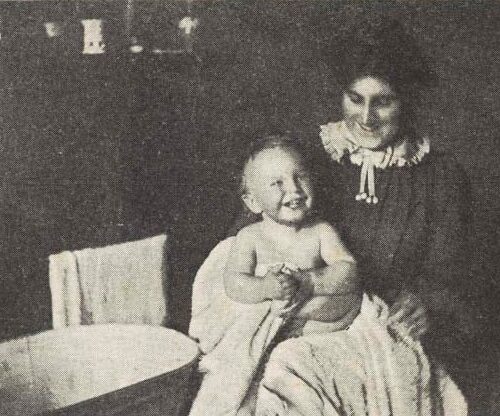

The courage and steadfastness which lead thoughtful people to declare themselves openly Rationalists in face of conventional social pressure is often shown in other directions…
The Literary Guide, July 1951
Beatrice McCabe was a suffragist, humanist, and – in her later years – a homesteader, raising animals and growing food to support the needy around her home in Sussex. Described in The Literary Guide as ‘an earnest worker in the Rationalist and Ethical movements’, Beatrice was involved in the South Place Ethical Society and the Hampstead Ethical Institute, lecturing, organising, and contributing much to the social life of humanism.
Beatrice McCabe was born Beatrice Alice Ann Lee on 6 October 1880 in Leicester. Her father, William Lee, was a framework knitter and member of Leicester Secular Society, through which it’s likely Beatrice met the ex-Catholic freethinker Joseph McCabe, who would become her husband. The pair married in a Leicester register office in 1899, and went on to have four children: Frank, Athene, Dorothy, and Ernest.
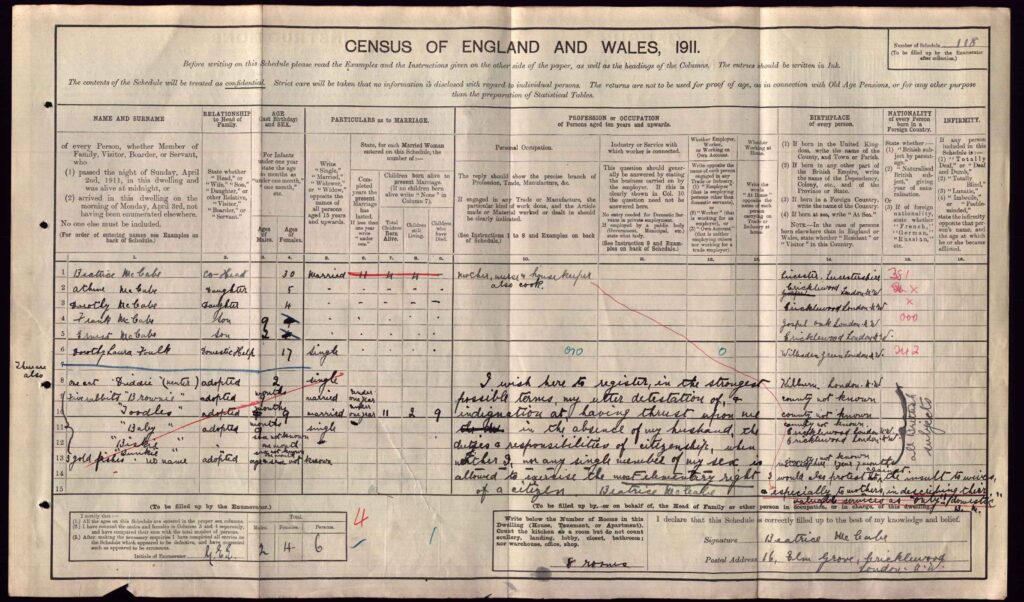
The family lived first in Cricklewood, and it was here, in 1911, that Beatrice took part in the census defacement promoted by the Women’s Freedom League in protest at women’s inability to vote. Beatrice, at home with the children, listed every member of her household, including pets – whose marital status and places of origin she also noted. Additionally, she wrote:
I wish here to register, in the strongest possible terms, my utter detestation of, & indignation at, having thrust upon me in the absence of my husband, the duties & responsibilities of citizenship, when neither I, nor any single member of my sex is allowed to exercise the most elementary right of a citizen.
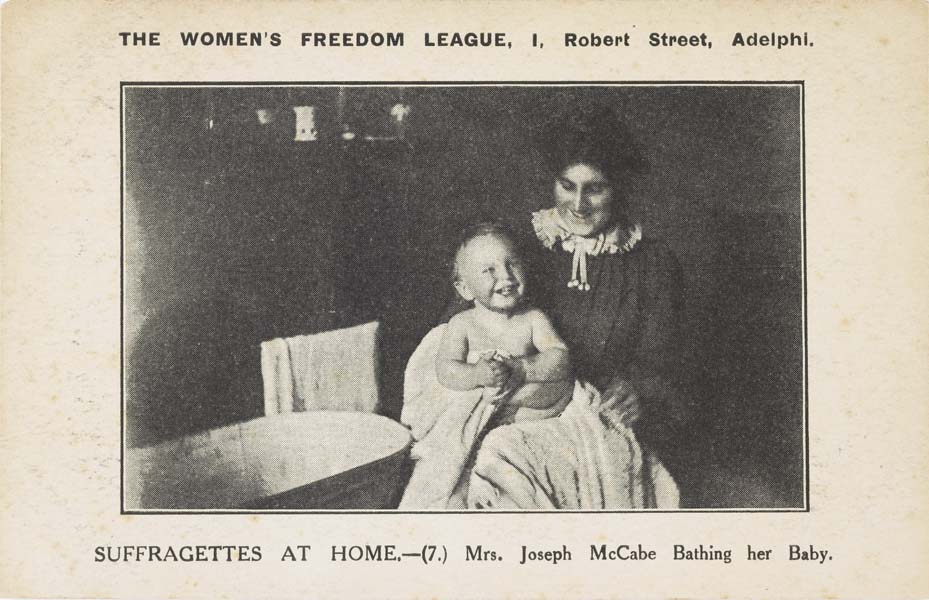
She added: ‘I would also protest against the insult to wives, and especially to mothers, in describing their valuable services as “only domestic”.’ Beatrice McCabe was featured in the Women’s Freedom League postcard series ‘suffragettes at home’ – a response to accusations that suffragists were unfeminine, or necessarily neglectful of their domestic ‘duties’.
A longtime member of the Hampstead Ethical Institute (later the Hampstead Humanist Society), Beatrice McCabe was also active in the South Place Ethical Society, including as organiser of Sunday services for children. In the 1930s, she was Honorary Secretary of the South Place branch of the League of Nations Union, for all who had ‘the cause of Peace at heart’.
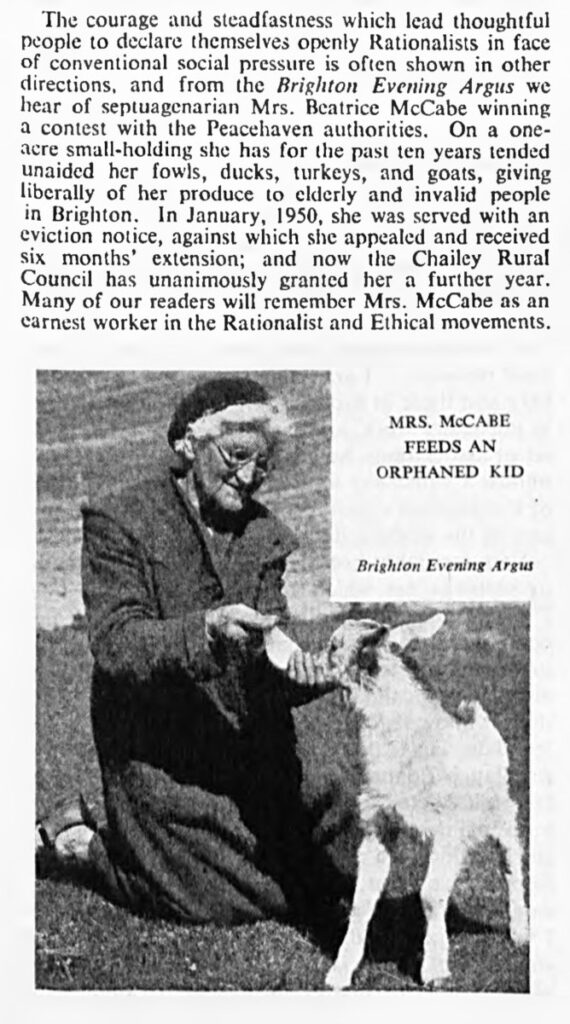
Beatrice and Joseph McCabe’s marriage ended in 1925, and she later moved from London to Sussex, where she lived out her life. She made papers in 1951, when the converted garage in Peacehaven, where she’d lived for 11 years, was threatened with demolition. McCabe argued her case before the Council, telling them she’d moved to the smallholding in 1940 to grow produce and play her part in the war effort. When the committee decided to reconsider the demolition in a year, she said: ‘I’m over 70, so I shall not likely be wanting the place for more than another two or three years.’ To which the chairman replied ‘Another 20, more likely.’ The incident was also reported in humanist journal The Literary Guide, which noted:
The courage and steadfastness which lead thoughtful people to declare themselves openly Rationalists in face of conventional social pressure is often shown in other directions, and from the Brighton Evening Argus we hear of septuagenarian Mrs. Beatrice McCabe winning a contest with the Peacehaven authorities. On a one acre small-holding she has for the past ten years tended unaided her fowls, ducks, turkeys, and goats, giving liberally of her produce to elderly and invalid people in Brighton. In January, 1950, she was served with an eviction notice, against which she appealed and received six months’ extension; and now the Chailey Rural Council has unanimously granted her a further year. Many of our readers will remember Mrs. McCabe as an earnest worker in the Rationalist and Ethical movements.
The Literary Guide, July 1951
Beatrice McCabe died at the New Sussex Hospital for Women on 16 November 1960.
Beatrice McCabe deserves her place in the pantheon of freethinking women who played key roles in the social and activist efforts of the early 20th century humanist movement. McCabe championed human rights and international peace, buoyed by and contributing to the shared aims of the Ethical movement.
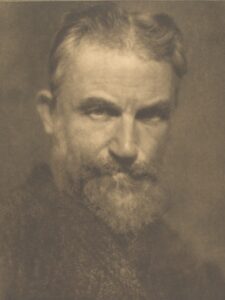
The death of Shaw is to progressive people of the twentieth century what the death of Voltaire must have been […]
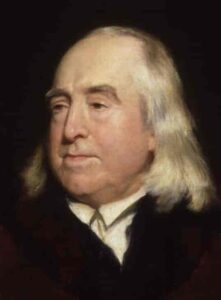
It is impossible that Theology can throw any light upon either morality or jurisprudence. Jeremy Bentham Philosopher and jurist Jeremy […]
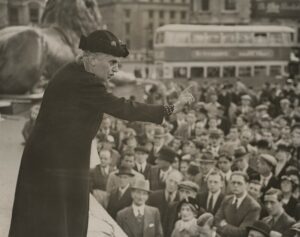
Only victory will put an end to it all. But meantime let no one say: ‘We are not responsible.’ We […]
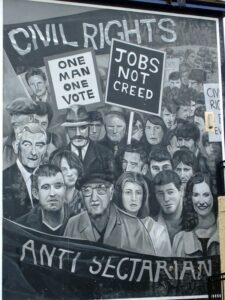
A brief history of humanism and secularism in Northern Ireland Organised humanism began in Northern Ireland in the 19th century, […]